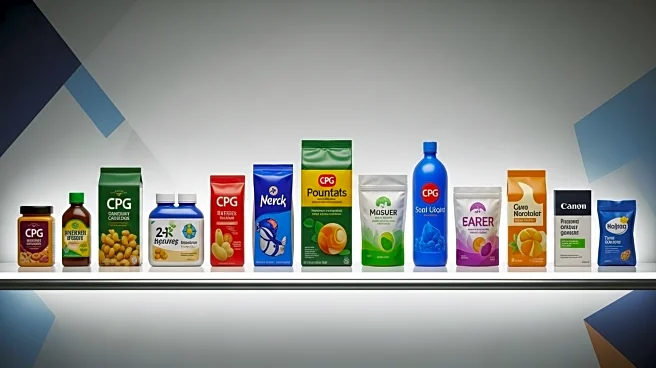What's Happening?
Consumer packaged goods (CPG) companies are actively engaging in mergers, acquisitions, and strategic realignments in response to shifting consumer trends, rising input costs, and evolving regulations. Notable examples include Keurig Dr Pepper Inc.'s acquisition of JDE Peet’s for $18.4 billion, followed by plans to split into two independent companies. Similarly, Kraft Heinz is reorganizing into two separate entities to better manage its extensive brand portfolio. The Ferrero Group's acquisition of WK Kellogg Co for $3.1 billion marks another significant move, aiming to focus on high-growth snack segments. These actions reflect a broader trend of companies redefining their core business areas to adapt to market demands.
Why It's Important?
The ongoing mergers and acquisitions within the CPG sector highlight a strategic shift as companies seek to optimize their operations and enhance shareholder value. This trend is driven by the need to address challenges such as high interest rates, inflation, and geopolitical uncertainties. The strategic realignments are expected to impact the competitive landscape, potentially leading to increased efficiency and innovation. However, the reduction in SNAP benefits and the rising popularity of GLP-1 drugs for weight management could influence consumer behavior and demand, prompting further adjustments in company strategies.
What's Next?
As companies continue to evaluate their portfolios, further divestitures and acquisitions are anticipated, particularly as firms assess their exposure to changing consumer preferences and economic conditions. The reduction in SNAP benefits, set to take effect in 2026, may lead to increased consolidation in the grocery sector, affecting food and beverage M&A activity. Companies are likely to focus on strategic transformations to align with health and wellness trends, efficiency improvements, and digital advancements, supported by private equity investments.
Beyond the Headlines
The evolving M&A landscape in the CPG sector underscores the importance of strategic agility in navigating market challenges. Companies are increasingly leveraging data and analytics to inform their decisions, ensuring they remain competitive in a dynamic environment. The emphasis on health and wellness, coupled with digital transformation, reflects broader societal shifts that could redefine consumer expectations and industry standards in the long term.










